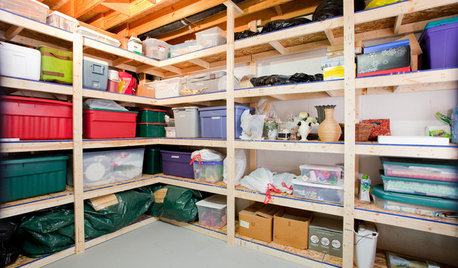Safely Use wood ash in organic fert mix?
lvannote
18 years ago
Related Stories

PETSThe Crate Conundrum: A Safe Place for Your Pooch
Get ideas for a comfy den for your dog that works well with your space too
Full Story
DECORATING GUIDESIsn’t It Good, Nordic Wood: The Appeal of Pale Floors
From silvery ash to honey blonde or chalk white, light-toned floors hold the key to the pared-back simplicity of Scandinavian style
Full Story
KITCHEN DESIGNNew This Week: 2 Kitchens That Show How to Mix Materials
See how these kitchens combine textures, colors and materials into a harmonious whole
Full Story
KITCHEN CABINETSKitchen Confidential: 7 Ways to Mix and Match Cabinet Colors
Can't decide on a specific color or stain for your kitchen cabinets? You don't have to choose just one
Full Story
BASEMENTS12 Tips for Supremely Organized Basement Storage
Basements practically beg to store stuff. These pointers help them hold belongings safely, effectively and with uncompromising style
Full Story
Houzz Gifts: Set an Organic Glam Table
Sprinkle some glitz around natural pieces for a holiday table that's as festive as it is feel-good
Full Story
WOODWORKINGHow to Clean and Care for Your Butcher Block
Keep butcher block counters and boards looking sharp as a knife — and sanitized for safe food prep — with this advice from a pro woodworker
Full Story
KITCHEN DESIGNKitchen of the Week: Organic Modernism in Seattle
Craftsmanship from top to bottom gives a linear kitchen overlooking Puget Sound a natural feel
Full Story
REMODELING GUIDESPro Finishing Secret: Aniline Dye for Wood
Deeper and richer than any stain, aniline dye gives wood stunningly deep color and a long-lasting finish
Full Story
GARDENING GUIDESHow to Switch to an Organic Landscape Plan
Ditch the chemicals for a naturally beautiful lawn and garden, using living fertilizers and other nontoxic treatments
Full StorySponsored
Columbus Area's Luxury Design Build Firm | 17x Best of Houzz Winner!
More Discussions








Heathen1
Kimmsr
Related Professionals
Bellefontaine Neighbors Landscape Contractors · Canby Landscape Contractors · Hoover Landscape Contractors · Methuen Landscape Contractors · Oxnard Landscape Contractors · Pine Hills Landscape Contractors · Pompton Lakes Landscape Contractors · Pueblo West Landscape Contractors · Streamwood Landscape Contractors · Wailuku Landscape Contractors · Glasgow Decks, Patios & Outdoor Enclosures · Meridian Decks, Patios & Outdoor Enclosures · Parker Decks, Patios & Outdoor Enclosures · Port Saint Lucie Decks, Patios & Outdoor Enclosures · Troy Decks, Patios & Outdoor Enclosuresorganic_kathryn
Kimmsr
organicgrinder